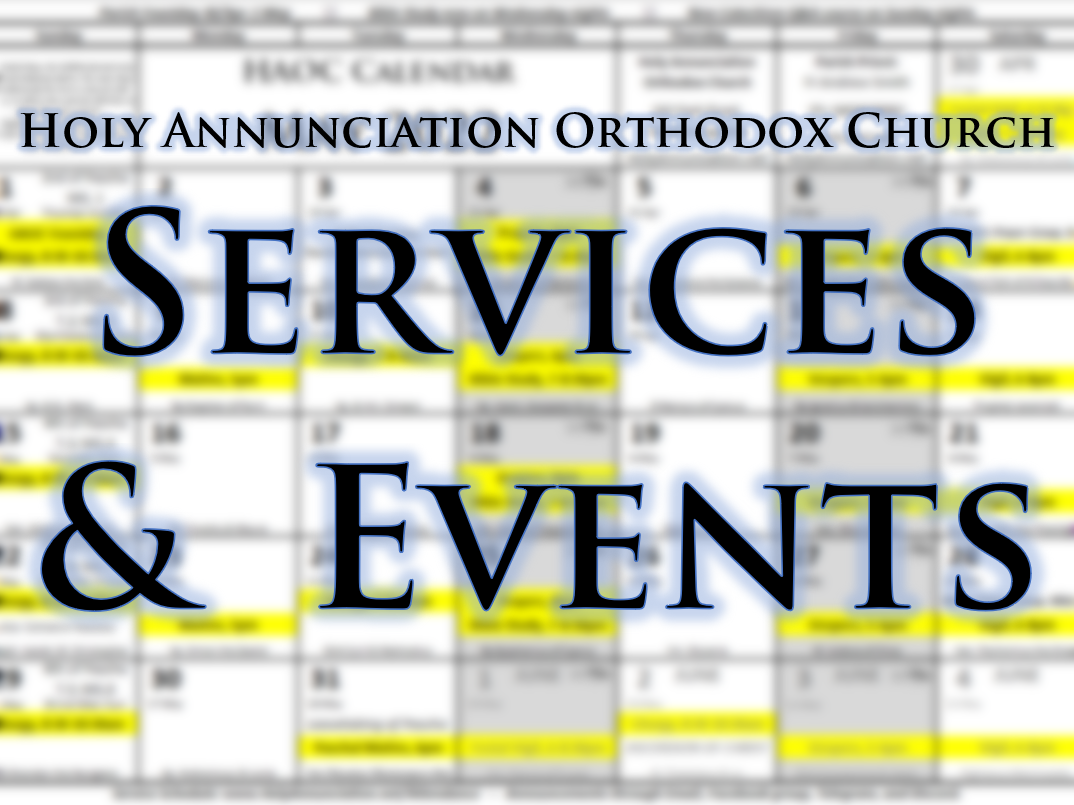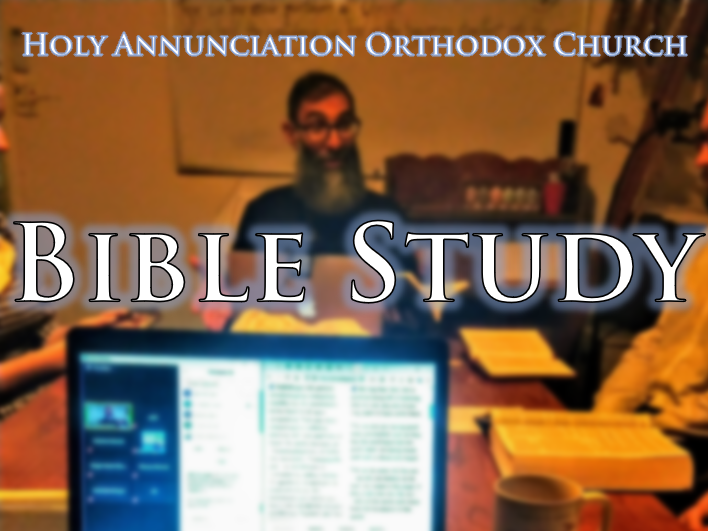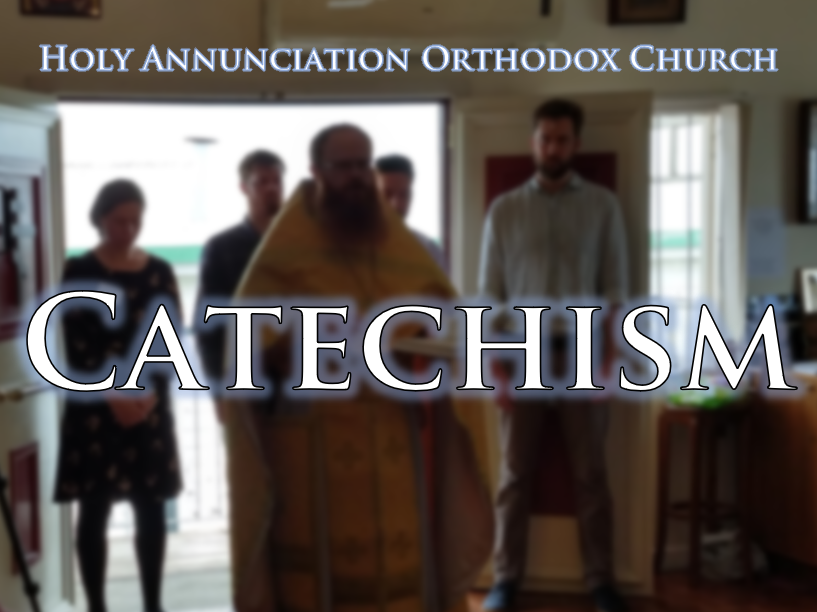The Sacrament of Holy Unction
In our liturgical tradition, the Sacrament of Holy Unction is a part of the customary preparation for Holy Week and Pascha.
The Queensland Deanery Schedule for serving Unction
will be available at the beginning of Great Lent each year.
What is Unction?
Holy Unction is a Sacrament where the body is anointed with holy oil to invoke the grace of God over those who are ill. We not only ask for healing of the body, but also for healing of the soul – treating sin as a spiritual illness, while asking for the patience to accept the will of God.
The sacrament of “anointing with oil” was instituted by our Lord Jesus Christ Himself (Matt. 10:1; Mark 6:13), and is most explicitly taught in the Epistle of James: “Is any sick among you? let him call for the elders of the church, and let them pray over him, anointing him with oil in the name of the Lord; and the prayer of faith will save the sick man, and the Lord will raise him up; and if he has committed sins, he will be forgiven” (5:14-15). In addition, this Sacrament was known to Fathers of the early Church – Sts Irenæus of Lyons, Basil the Great and John Chrysostom all attest to its existence, and are even the authors of prayers read during the celebration of this Sacrament.
While this sacrament may be served in a hospital or home as needed, it is served in church during Lent as a means of preparation for Holy Week. This service is ideally served by 7 priests, and the faithful are anointed by each. The Sacrament is closely connected to the Sacraments of Confession and of Communion.
What the service looks like...
A table is placed in the church and is covered with a clean cloth. On this are placed various things:
- A bowl is filled with grains of wheat to symbolise new life – whether for recovery or for the resurrection.
- An empty glass is placed in the middle of the bowl.
- Seven sticks (with ends wrapped in cotton wool) are placed into the wheat – symbols of the olive branch, brought to Noah in his ark, signifying grace-filled spiritual renewal from the flood of illnesses and sins.
- Two vessels – one of wine and the other of pure olive oil – are also placed on the table. The wine represents the Blood of Christ, spilled on the Cross for the salvation of all people, while the oil is an ancient form of medicine in its own right, and represents the mercy of God.
- Other items include the Book of the Gospels and a Blessing Cross.
The service begins with censing, before we hear a series of prayers, Psalms 142 and 50, hymns of supplication to God, a canon relevant to the service, and prayers asking saints to also pray to God for us. The priest pours the oil and the wine into the empty glass and mixes these together.
Seven candles are lit and stood in the wheat, with the candles of all present being lit. A prayer for forgiveness and for the sanctification of the oil is read, then we hear the first Epistle reading from the Epistle of St James about the establishment of this sacrament, and then a priest will read the first Gospel reading on the Good Samaritan. There are a total of 7 Epistle Readings, 7 Gospel Readings, and 7 prayers, each read in sequence.
The final prayer is read with an opened Gospel over the heads of those being anointed. The service concludes with a brief litany, a few hymns and the dismissal.
After this, all those who have prepared come forward for anointing of the forehead, nostrils, cheeks, lips, chest and hands (both sides), while the priest prays that God, our heavenly Physician of both soul and body, will heal each person from all sicknesses.
What are the rules around this service?
Because Unction is a Sacrament of the Church, only Orthodox Christians who are in good standing may be anointed. This anointing is on the forehead, nostrils, cheeks, lips, chest (i.e. upper sternum), and on both sides of the hands.
Do not be late for the service. Like any sacrament, it is important to be present and praying from the start of the service through to the anointing. Prior to the service, please write your name on the paper provided, so that the clergy are able to pray for you during the service, and receive a candle. This candle will be held throughout the service.
Unction is customarily served during Great Lent, as a supplement for the Sacrament of Confession – in particular, those sins that have been forgotten. As such, those who are physically healthy should not receive Unction more than once during Lent. In addition, physically healthy children who have not reached the age of Confession are not anointed.
In addition to your normal church dress, we ask that an open-collared top is worn (as the upper sternum is anointed). We also ask that no cosmetics are worn.
At Holy Annunciation, we do not distribute the blessed oil and wine after the service. If there is someone who needs to be anointed, but who is too sick to attend the service, please contact a priest so that he can visit them in person.
In short: who is able to be anointed at these services?
A person must be:
- a baptised Orthodox Christian (i.e. have been sacramentally received into the Eastern Orthodox Church);
- in good standing (i.e. not have any canonical impediments to receiving Communion);
- in attendance from the beginning of the service; and,
- for those who are otherwise physically healthy:
- above the age for Confession (as those who are younger have no need), and,
- receive only once during Great Lent.
What is the difference between 'General Unction' (served in Great Lent) and 'Unction' at any other time?
The primary differences are in the purpose for which we serve this sacrament.
The Sacrament of Holy Unction is served when a person is in need of healing of soul and body. This reveals a holistic understanding of the human person, where problems in one area are often intertwined with other areas. Typically, when Unction is served, it is because a person is in need of healing of a malady or illness.
During Great Lent, however, we place much greater attention on the healing of the soul. While the service is virtually identical, this purpose means that we place restrictions on who is able to be anointed - that is, only those who are attending Confession, and, that a physically healthy Orthodox Christian may be anointed at only one service of General Unction during Great Lent. Unction is considered to be an important part of the preparation for Holy Week and Pascha, which also includes prayer, fasting, attending services, Confession and Communion).
(NB: There is also an abbreviated service of Unction, designed for use in a hospital setting.)
If you have any questions, please contact Fr Andrew directly.




